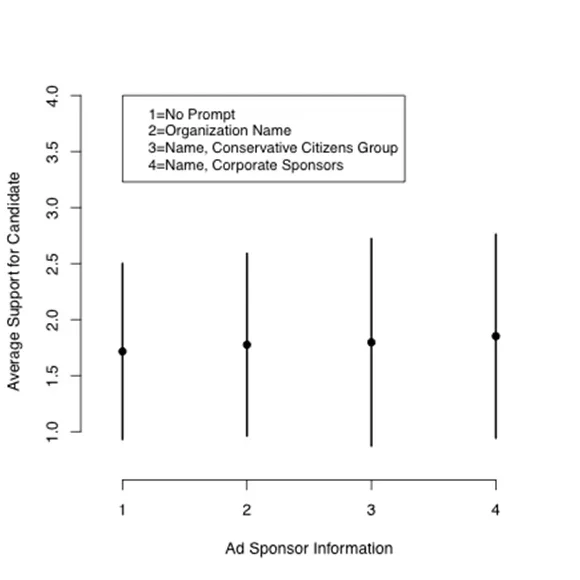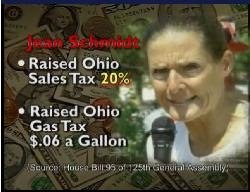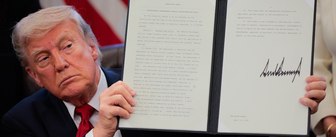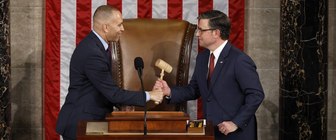In the wake of the Supreme Court’s decision in Citizens United v. FEC, the subject of corporate sponsorship of political advertising has been extremely controversial, with President Obama going so far as to directly criticize the decision during a State of the Union Address with Supreme Court justices in attendance. More broadly, there has been extensive debate about whether sponsors of political ads should be forced to identify themselves and disclose their donors. In a recent controversial vote, Senate Republicans blocked a measure that sought to force interest groups to name the donors who sponsored advertising such as political attack ads on television.
A recent YouGov survey asked 1000 respondents to read a (fictional) partial transcript for such an attack ad and asked them how likely they would be to vote for the candidate described in the ad. The actual text of the question is:
Gary Freeman is a [randomized "Democrat", "Republican" or none] member of Congress who currently represents the 5th congressional district in the state of [randomized to be "Ohio", "California" or "Pennsylvania", not the same as respondent’s home state].
Please read the partial transcript below of a recent television commercial about this congressional race:
Gary Freeman: what do we really know about him?
In his time in Congress, Freeman has accepted money from the very same special interests he was supposed to be regulating.
He voted to raise the deficit nearly one hundred times during his career in Congress.
When you cast your ballot in this election, tell Gary Freeman that he does not represent the voters of [state].
[source prompt]
If you were voting in this election, how likely would you be to vote for Gary Freeman?
The source prompt was randomized to have one of four values:
- THIS AD WAS PAID FOR BY AMERICANS FOR RESPONSIBLE GOVERNMENT.
- THIS AD WAS PAID FOR BY AMERICANS FOR RESPONSIBLE GOVERNMENT. (Note: Americans for Responsible Government is a conservative citizens group.)
- THIS AD WAS PAID FOR BY AMERICANS FOR RESPONSIBLE GOVERNMENT. (Note: Americans for Responsible Government is a groups funded by corporations such as Exxon Mobil, Time Warner, and Kraft Foods.)
- [no prompt listed - source not mentioned].
The intention was to test whether the hypothetical advertisement would vary in effectiveness based on the disclosed sponsor of the ad. The results, although only suggestive, are somewhat surprising. As shown in the figure below, the average support for the hypothetical candidate (where 1 is "very unlikely" and 4 is "very likely" to vote for) does not vary much at all with the information about the ad’s sponsor. The vertical bars span one standard deviation above and below the mean for each for the four treatments. This indicates that the effect of disclosing the sponsors behind political advertising may not be as dramatic as many observers have thought.

While there are several concerns with the experiment (reading a short bit of text might not mimic the experience of viewing a campaign ad, for example), these results provide at least a first suggestion that fears about disclosure of the sponsors of political advertising may not be as crucial as once thought. Furthermore, some of the survey question’s characteristics (that respondents have no information about the hypothetical candidate described in the ad, for example), would be thought to increase the effect. Overall, these results suggest the need for further study, but at the least, they certainly do not show that voters will necessarily change their behavior in response to such proposed disclosure provisions.
Image source: Flickr (OhioProgressive)










